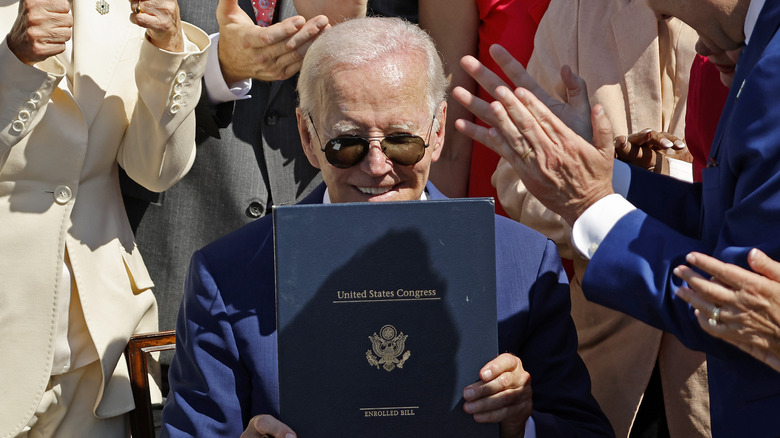Biden Passes Bill To Boost Chip Manufacturing In The U.S.
Semiconductors are inarguably the most important component in any modern electronic device, forming the basis of electrical processes that make a computer's brain work properly. As time has worn on, semiconductors have become more efficient and more compact, but the COVID-19 pandemic caused significant damage to many of the critical supply lines and semiconductor fabrication plants that provide the world's electronic building blocks.
This ongoing semiconductor chip shortage has negatively impacted sales for many companies across several consumer industries. In April, Apple's iPhone 14 was predicted to release with the same A15 chip as seen in the current iPhone 13 models, and the company's slowdown in sales resulted in a drop in stock value that steadily continued into June, bottoming out at a low of $130.04 per share on June 16, according to the NASDAQ (via Google Finance) before gradually rebounding.
Computer manufacturers like Apple aren't the only ones affected. A wide variety of industries rely on semiconductors in 2022, especially given that a significant number of new appliances and vehicles rely on computer chips even for rudimentary-seeming functions like seatbelt tightening and the braking systems in cars. Recently, General Motors reported that it would need to complete the development of more than 95,000 unsellable vehicles over the latter half of 2022. The reason? A lack of semiconductors to build the computer chips that would power many of the critical functions of those vehicles, making them unsafe to drive.
New U.S. funding could hasten semiconductor production
Semiconductors aren't built just anywhere — in fact, most of the world's supply is manufactured in fabricating plants located in Asia, with most of them in Taiwan specifically, as explained by CNBC. But now, U.S. policymakers are fighting to speed up the United States' semiconductor manufacturing capacity in a vie to compete with China and Taiwan in the global semiconductor market, which should mean that shortages of electronic goods in the United States will be greatly alleviated.
On August 9, President Biden signed a bill to subsidize over $52.7 billion to semiconductor manufacturers across the United States, saying, "We believe anything and everything is possible. It's the heart and soul of this country." As reported by Reuters, U.S. chipmakers are already taking advantage of the bill, which includes a $200 billion stimulus toward semiconductor research over 10 years, as well as a 25% investment tax credit for chipmakers.
The Semiconductor Industry Association noted in its 2022 factbook that the United States maintained a 46.3% global market share for semiconductor firms based in the United States despite only manufacturing about 21.9% of the world's semiconductors in 2021, paling in comparison to China, Korea, and Taiwan's combined output of 61.7%. However, the report acknowledges the incentives offered by Asia-based semiconductor companies pulled resources away from U.S.-based chipmakers, shaving off about 10% of the United States' total manufacturing capacity (which is based on a mix of resources, supply route capacity, manufacturing real estate, and workers) over the course of eight years between 2013 and 2021. However, as noted by Reuters, China isn't taking the new bill too well, even going as far as billing it a "Cold War mentality" on Biden's part.

